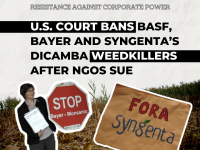U.S. Court Bans BASF, Bayer and Syngenta’s Dicamba Weedkillers After NGOs Sue

U.S. Court Bans BASF, Bayer and Syngenta’s Dicamba Weedkillers After NGOs Sue
Engenia, Tavium and Xtendimax — three weedkillers sold by Bayer, Syngenta and BASF respectively — share a common toxic ingredient: dicamba. First approved for use in the U.S. in 2016 on certain crops, the three weedkillers were outlawed in 2020 after they were found to kill other crops. Industry lobbied to put them back on the market, but four NGOs successfully won a lawsuit in February 2024 to re-impose the ban.
“No matter how far EPA (the U.S. Environmental Protection Agency) goes to contort itself to do industry’s will, it just can’t pass legal muster. The court has seen straight through the EPA’s ploys to ram through a product that is far too dangerous to be on the market.” – Lori Ann Burd, environmental health program director for the Center for Biological Diversity
Dicamba
Dicamba-based weedkillers have been used since the 1960s. In 2016, Engenia, Tavium and Xtendimax were approved by the EPA to be used on genetically engineered cotton and soybeans made by agri-business giant Monsanto, to kill weeds resistant to other herbicides. This was despite the fact that dicamba has a tendency to volatilize and “drift” in warm weather and pose a danger to other crops.
The Companies
Bayer and Syngenta are two of the biggest agrochemical companies in the world. Bayer has been forced to pay over US$10 billion in damages to tens of thousands of people who developed cancer after using its Roundup weedkiller. Syngenta has also been sued dozens of times for causing Parkinson’s disease by people who used its herbicide Gramaxone, which has been banned in dozens of countries.
Peach Farmer Sues
Missouri peach farmer Bill Bader successfully sued BASF and Bayer after his orchard lost 30,000 trees to dicamba drift. Courts awarded him US$265 million in 2020 (later reduced to US$75 million). Bayer also announced a US$400 million settlement with soybean farmers in 2020 who sued over dicamba drift. Thousands of other farmers have reported dicamba damage to crops and hundreds more have filed suit.
Companies Knew
Internal BASF and Monsanto (now owned by Bayer) documents show that the companies predicted dicamba would cause damage. Some employees even joked about sharing “voodoo science” and hoping to stay “out of jail.” Other documents also illustrated company strategies to hook farmers on dicamba despite warnings from academics, crop growers and even their own employees.
Corporate Lobbying
In 2020, the Center for Biological Diversity, the Center for Food Safety, the National Family Farm Coalition and Pesticide Action Network won a lawsuit to withdraw approval for the three weedkillers. Months after the court ruling, the EPA reversed the ban after numerous meetings with Bayer executives.
Victory
The four NGOs that won the 2020 ban sued again after the ban was reversed. In February 2024, a federal court ruled the EPA violated U.S. law by reapproving the herbicide without public notice. (In a minor setback, the EPA recently announced that they will allow farmers to use dicamba purchased before the ban.)
Companies’ Response
“We respectfully disagree with the ruling and are assessing next steps. Our top priority is making sure growers have the approved products and support they need to safely and successfully grow their crops.” – Bayer statement
“This Order may threaten the livelihoods of soybean and cotton farmers who rely on over-the-top dicamba to control resistant weeds.” – BASF statement
This is #80 in our series of Instagram infographics on resistance against corporate power.
Click here to see the full post on Instagram.



